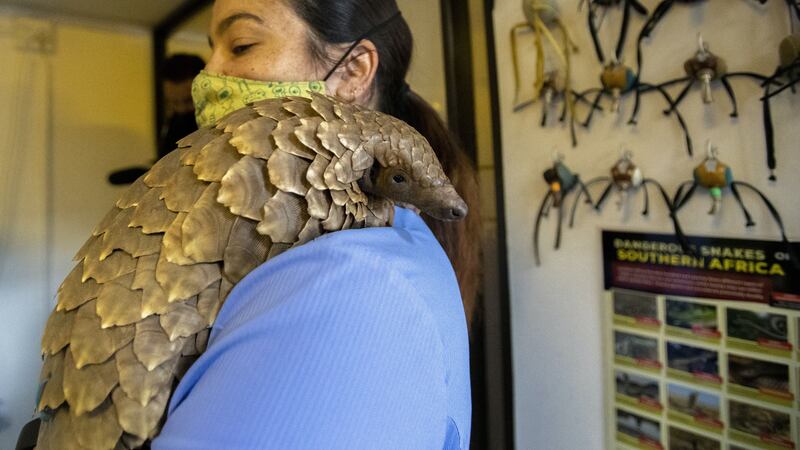Traumatised pangolins rescued from poachers are being nursed back to health by a dedicated team of volunteers at a South African wildlife clinic.
The animals arrive at the Johannesburg site emaciated and badly injured, but they are the lucky ones, as they will survive thanks to the staff who tend their wounds, feed them and coax them back to health.
Pangolins are the world’s only mammals with scales. They are sometimes called scaly anteaters, although they’re not related. Like armadillos, they can roll up into an armoured ball, and their tongues can be longer than their bodies.
Pangolins are not well known and yet they are among the most poached and illegally trafficked animals in the world.
While species like the rhinoceros and elephant often headline anti-poaching efforts in Africa, experts warn that these little critters, about the size of a domestic cat, are targeted more and nearing extinction because of high demand for their scales in traditional medicines in Asia.
The African Pangolin Working Group in South Africa — a team of vets and wildlife experts — have been rehabilitating pangolins rescued from poachers for nearly a decade.
“When we receive those pangolins they are all compromised, whether they have been with the poachers for a few days or sometimes up to two weeks,” said Nicci Wright, a wildlife rehabilitation expert and executive director of the group.
“Some are very emaciated. They have got wounds, they have got injuries and it is very pitiful and very difficult to emotionally deal with that kind of suffering and abuse.”
The animals are often caught in crude snares and recently the group received a pangolin cut deeply through its torso by a snare, almost from stomach to back, said Ms Wright, at the Johannesburg Wildlife Veterinary Hospital, where rescued pangolins are cared for.
The animals are treated, put on a drip for rehydration, tube-fed a specially designed recovery diet, and sedated so they sleep for up to 48 hours. Then they are moved to undisclosed locations so the wildlife hospital is not targeted by poachers.
“They have been looked at, poked, prodded, shipped around from place to place, opened up and looked at again,” said Ms Wright. “Rest is the most important thing, next to the physical recovery.”
Pangolins are intriguing creatures. The scales are made of keratin, the same substance in human fingernails, and are incredibly tough. That extra-long and dexterous tongue is an expert ant-catching tool which rolls back into a special sheath in the chest cavity.
The pangolin group’s chairman, Professor Raymond Jansen, recorded 97 tons of pangolin scales seized from smugglers trying to take them out of Africa last year, equating to about 150,000 poached animals. He estimates it is only about 20% of the total figure as the rest eludes authorities.
“If this trend continues and this demand is provided, then there is a very likely extinction event for all eight species of the pangolin,” said Prof Jansen, whose day job is working in the Department of Environmental, Water and Earth Sciences at Tshwane University of Technology in the South African capital, Pretoria.
With that in mind, the pangolin group is not just treating pangolins – it is fighting back. It works with police to identify and catch poachers and traders, often in undercover operations. Last month, two men were arrested in a basement car park in Pretoria trying to sell a pangolin for about £15,000.
The work brings an element of personal danger for Prof Jansen, who sometimes poses as an illegal buyer and meets poachers before police pounce and arrest them.
The group is also honing its anti-trafficking techniques. The latest programme is training dogs to sniff out pangolins being hidden and transported.
A dog named Havoc is the continent’s first pangolin detection dog and recognises the scents of all four African pangolin species, the group said.







